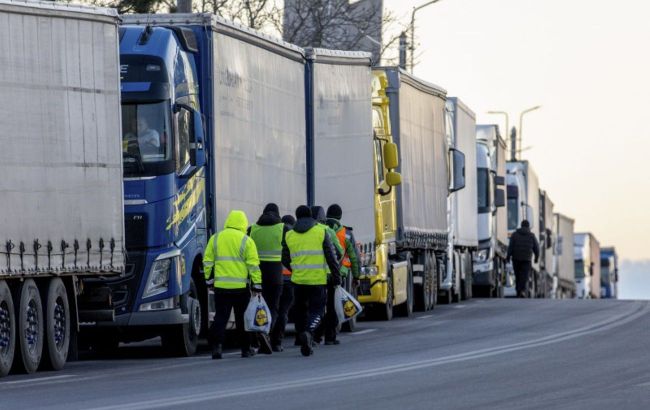'Strategic pause': Situation at Poland-Ukraine border and prospects for Romania's blockade resolution
 Trucks blocked at the border between Romania and Ukraine (Photo: digi24.ro)
Trucks blocked at the border between Romania and Ukraine (Photo: digi24.ro)
The blockade of the western borders for trucks seems to be coming to an end. At least from the Polish side, border crossings will remain open until at least March 1. A decision from Romania is expected in the coming days.
For more details on the border situation, agreements with Poland, and when the blockade of Romanian checkpoints will end, read RBC-Ukraine's material.
The material was prepared using data from the Western Regional Directorate of the State Border Service of Ukraine, information from Gazeta Wyborcza and Digi24, a statement from Vice Prime Minister, Minister of Communities, Territories, and Infrastructure Development Oleksandr Kubrakov, and a comment from the spokesperson of the State Border Guard Service, Andriy Demchenko.
Poland has opened up, while Romania is blocking two points: the border situation
According to the information from the Western Regional Directorate of the State Border Service of Ukraine, there are no queues at pedestrian and automobile checkpoints on the border with Poland and Romania. Regarding cargo trucks, there are no physical queues from the Ukrainian side either, as they are registered in the E-queue service (Ukrainian electronic border crossing queue - Ed.).
Andriy Demchenko, the spokesperson for the State Border Guard Service, notes that the passenger flow, which also affects the formation of queues, is currently lower than during the New Year and Christmas period. While during the holidays, it fluctuated at the level of 120-140 thousand people per day in both directions, yesterday only 62 thousand people crossed the border.
"With a decrease in passenger traffic, queues disappear, all checkpoints are practically empty, there are no queues," he explains in a comment to RBC-Ukraine.
As for the Polish border, more intensive movement towards the Rawa-Ruska and Krakovets checkpoints began yesterday at 4:00 PM, and around 8:00 PM - towards Yagodyn. On the Polish side, these are the points Hrebenne, Korczova, and Dorohusk, respectively.
"The direction of the Shehyni checkpoint was unblocked on January 6. Currently, no direction is blocked from the Polish side," he adds.
However, queues still remain on the approach roads because a large number of trucks are waiting for the opportunity to leave Poland. As of the morning of January 17, there were about 1900 trucks, with 800 of them waiting in the direction of Shehyni. From the Ukrainian side, an increase in the electronic queue for Yagodyn is noted - currently, 1200 trucks are registered, although a few days ago, there were up to 300 trucks in the E-queue in this direction.
Due to protests by farmers, a blockade of the Siret and Vicovu de Sus checkpoints towards the Ukrainian Porubne and Krasnoilsk continues on the Romanian side.
"The blockade is taking place at a certain distance from the border. Moreover, the peculiarity of these points is that only empty trucks can cross Krasnoilsk, while loaded trucks go to Porubne. Literally, only a few crossed it in the past day, although this direction can pass 500-600 trucks per day in both directions," emphasizeі Demchenko.
The number of cargo trucks waiting on Romanian territory is unknown, as Ukrainian border guards do not have such information.
"Strategic pause" until March 1. What was agreed in Poland
It's worth noting that protests at the border have been ongoing since early November for several reasons. Firstly, Polish drivers criticized the electronic queue for leaving Ukraine, claiming discrimination against them. Secondly, they demanded a separate queue for empty trucks, and thirdly, they wanted to restore the permit system for Ukrainian companies and prohibit the registration of those whose capital comes from outside the EU.
Yesterday, they reached an agreement with the new government of Donald Tusk, as part of which they will suspend the protests.
"It won't be the end but there will be a suspension of the protest. We agreed certain conditions, we will give the government time to work as it is a new government," said Tomasz Borkowski, a representative of the Committee to Protect Transporters and Transport Employers.
The agreement provides for the lifting of the blockade of the Korchova, Hrebenne, and Dorohusk checkpoints until March 1, 2024. According to the Polish Minister of Infrastructure Dariusz Klimczak, the parties will begin intensive negotiations aimed at a specific effect. The current agreement includes 7 points covering many issues.
"They concern the complete exclusion of the road border crossing Malchovice - Nyzhankovychi within the pilot project in the electronic queue system. This also applies to monitoring the declaration by the Ukrainian side regarding the duration of the stay of trucks registered outside the territory of Ukraine. Until now, the duration of stay was 20 days. We will monitor the statements of the Ukrainian side about extending it to 60 days," the minister noted.
In the second half of January 16, the passage of trucks resumed at Krakovets and Rawa-Ruska in normal mode. As of yesterday evening, there were almost 700 trucks waiting to enter Ukraine. A little later, the passage also resumed at Yahodyn.
Deputy Prime Minister, Minister of Communities, Territories, and Infrastructure Development Oleksandr Kubrakov reminded that the list of measures had been agreed upon at the end of December, and "on our part, we practically did everything we promised."
He also provided more details about the agreements. In particular, the government of Poland will work on a compensation mechanism for carriers who lost Eastern markets due to Russia's invasion of Ukraine. They will also strengthen checks to prevent cabotage transport (within Poland) and create a system to control the transport services of Ukrainian companies.
Among other things, agreements with the protesters include measures that were previously agreed at the level of ministries of both countries:
- Creating a separate lane in the online queue for empty trucks Yahodyn - Dorohusk (technically already available).
- Opening the Uhryniv-Dołhobyczów checkpoint for empty trucks (done).
- Launching a pilot project at the Nyzhankovychi - Malchovice checkpoint without registration in the electronic queue (will last one month, after which the efficiency will be assessed). Ukraine insisted on its implementation only after the border was unblocked. Registration is currently suspended.
Earlier, it was also agreed to launch a joint Working Group to analyze the situation in the market of bilateral transportation and ensure effective customs and border control. The first meeting took place on January 8, and the parties agreed to prepare an action plan to balance the transportation market and reduce queues.
Polish Minister Dariusz Klimczak hopes that queues will disappear within a few days. And he promised to do everything possible to meet the demands of his carriers by March 1. In turn, the protesters say they have given the government a vote of confidence.
"We give the ministry a vote of confidence. This is not a capitulation but a strategic pause," said one of the protest leaders, activist Rafal Mekler.
The Romanian blockade may end in a few days
The border blockade from the Romanian side began on January 13, 2024. Initially, farmers blocked the movement of trucks through Siret opposite the Ukrainian checkpoint Porubne for several hours, causing the queue to immediately stretch for 6 km. Two days later, amid failed negotiations with the government, it spread to Vicovu de Sus opposite the Ukrainian checkpoint Krasnoilsk.
The reason is that Romanian farmers from the Suceava and Botosani regions complain about imports from Ukraine. According to them, Ukrainian grain has taken up all the capacities for transshipment at the Constanta port and has depressed prices for agricultural products. Among their demands is the need for subsidies and compensation for losses for those who suffered losses from this import, as well as the resumption of customs payments for Ukrainian goods.
Interestingly, at a press conference in December, Ukrainian President Volodymyr Zelenskyy, criticizing the Polish blockade, said that Ukraine had lost hundreds of millions of dollars and part of the harvest.
"EU was against border blockade. Thank God Romania appeared, and President (Klaus - Ed.) Iohannis helped our farmers survive. He had strikes; I believe he showed himself as a strong person," he noted.
Recently, the Ministry of Agriculture of Romania reached an agreement with the protesters. According to Minister Florin Barbu, it concerns 13 demands, and negotiations will continue to find a compromise on unmet requests.
It was reported that the Romanian government pledged to subsidize agricultural excise taxes until 2026, establish rules for subsidized loans, compensate for losses from Ukrainian grain, introduce marking of grain, and electronic monitoring of seals using GPS at the Constanta port. There is no mention of customs duties on the import of grain from Ukraine.
At the same time, as stated by the farmers' representative Marius Miku at the negotiations, the agreement does not mean an immediate end to the blockade. This is partly because negotiations with Romanian carriers may affect its duration.
The day before, more than 150 drivers from Ukraine staged a protest in the center of Siret, dissatisfied that the protests of farmers and carriers blocked their access to the customs. According to the representative of the gendarmerie Roxana Iuliana Botezatu, they were allowed to move in columns to the checkpoint from 09:30 today.
As of the second half of the day, about a hundred farmers were blocking Siret using about 50 tractors and 15 cars, and the column of blocked trucks at the exit to Ukraine reached about 20 km. As stated by the spokesperson for the border police of Suceava, Alina Petraru, since noon on Monday, no truck has entered through the Siret checkpoint. The passage of passenger cars, buses, and minibusses is in normal mode.
Romanian Prime Minister Ion Marcel Ciolacu hopes that the protests by farmers will end in a few days. He also justifies the actions by "accumulated disappointment."
"I tried to understand where they started from. In my opinion, they are justified. This is accumulated disappointment. We had a pandemic, an energy crisis, a war. There was an influx of goods from Ukraine into Romania. The material and technical support that farmers bought last year, they bought very expensively, in the spring it became cheaper, and the price of agricultural products increased. A cumulative factor that does not necessarily depend on the government but that we should notice," he noted.
Ukrainian border guards do not know when the blockade of trucks from the Romanian side will end.
"From the Romanian border police, we only have information that such actions have started. But about the reasons and how long it can last, Romanian border guards did not inform us directly," addі the spokesperson for the State Border Guard Service Andriy Demchenko.

